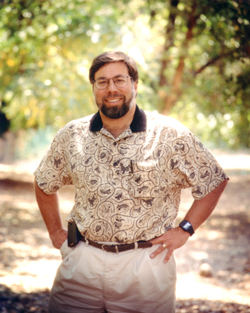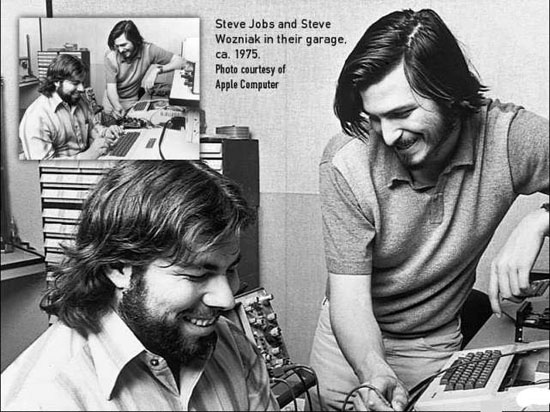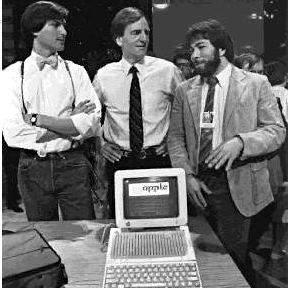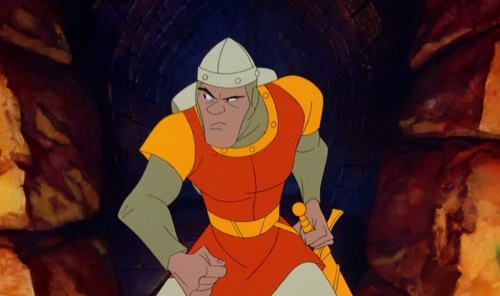What the other Steve has to say...
Date: 4 May 2007
Author: Benj Edwards, Gamasutra.com
Published at: Gamasutra.com
· Benj Edwards · Woz Was Here - Steve Wozniak On His Gaming Past ·
Computer engineer Steve Wozniak played an instrumental role on the landscape of personal computer design in the 1970s. As the co-founder of Apple Computer with Steve Jobs, he created the Apple I early personal computer, as well as its successor, the Apple II. The Apple II was the first microcomputer manufactured by Apple, and became one of the most popular personal computers in the 70s and early 80s...
Wozniak, or "Woz" as he is affectionately known, has also left his footprint in gaming history as well, having developed the initial prototype for classic Atari game Breakout in 1975 before founding Apple Computer. Recently we caught up with Woz, and took the opportunity to speak with him about his experience developing Breakout for Atari, as well as Steve Jobs' gaming habits, and the influences of video games on the personal computer industry.
How often did you visit Atari's offices back in the 70's around the time Steve Jobs worked there?
Steve Wozniak (SW): About three times maybe, not very often.
Not very often?
Woz: I dropped by, he invited me in and I showed off my little Pong board [A copy of Pong he created on his own time -Ed.] and they were kind of impressed at how few chips it was and wanted to hire me, then we did Breakout.
I didn't hang around there; I had a job at HP.
Can you describe the atmosphere around Atari at the time you visited their offices?
Woz: Not too well because I didn't interact with a lot of people. It wasn't a very large building...go through the halls and you see just about everything very quickly, and they had a big factory floor where they were actually making the machines.
I guess they were a pretty small company at the time.
Woz: Yeah. They seemed huge to me, this was the center of arcade games, you know, video arcade games for the world. That was "the company." So it seemed large. I don't know how you judge what's large and what isn't.

Well I was mostly talking about the number of employees, I guess.
Woz: Yeah. You've got the factory floor and you'd see one new game just lined up, cabinet after cabinet after cabinet, long lines of the same game. It was interesting to see.
That's cool.
Woz: And I felt like it was a historic place.
Do you think that's why Steve Jobs wanted to work there, because it just seemed like a really important place to be at the time?
Woz: I think he just...it was just one of a bunch of companies that were in the electronics...he probably just looked in the pages at who's hiring. I don't think he had a propensity towards Atari over any other company.
Did you ever meet Nolan Bushnell?
Woz: Oh yeah. I met him back then; he offered me a job when he saw my Pong game. I saw him a few times at Atari and then every other time I bumped into him -- I dealt more with Al Alcorn, though, became more friends with him, went out to lunch and all; over the years, even after Atari, I kept up with Nolan and would go visit him once in a while.
That's cool. So I guess you probably bump into him every once in a while because of computer and game history things, like conferences and stuff like that?
Woz: Yep.
What did you think about him at the time, back in the day, do you think he was doing a good job running Atari?
Woz: I thought he was an exciting pioneer. I don't know how to judge how somebody runs a business, but I mean he kind of started it by wanting to do this new thing that was so astoundingly different. So I admired him.
That's cool. Let's talk about Breakout just a little bit. I know you've talked about it a lot, but when you designed Breakout for Atari, how did you know what game to make? Did they give you a set of instructions about how the game would play, and then you worked from that?
Woz: Steve Jobs could have been a bit vague on it. He told me that Nolan Bushnell wanted a game that was like a single player Pong with bricks that you would hit and the ball would go behind them. So it was pretty well defined by the time I heard about it.
Did they have like a sketch of the way it would look on the screen or did you just interpret it yourself?
Woz: No sketch, I just interpreted it from the description I just gave you, very simple description. It came to a point where I was thinking of saving one more chip, and I might save half a chip if I put the score at the top instead of the bottom, and Steve said, no no no, it has to be at the bottom. He said Nolan wanted it there. That's how the game was defined. I don't know how much of that was true or Steve saying, "Here's how it should be," and just pretending it was coming from Nolan. I don't know.
I don't know how accurate this is or not, but I read somewhere that Atari couldn't use your Breakout design because it was too hard to manufacture. Is that true?
Woz: No, no, no. I did a clever little design with very few parts...
So they used your final?
Woz: The reason Atari wanted me to design it is they were tired of their games taking 150, 200 chips, and they knew I designed things with very few chips, so we had incentives for getting it under 50 or under 40 chips. That was my forte. Now I designed it, but it was... To save parts, I'll make no part go to waste and have tricky little designs that are hard for just a simple engineer to follow.
Once you understand it, it's very easy because there's so few parts, it's easier to understand. But they had trouble understanding it. So maybe some engineer there was trying to make some kind of modification to it, slight modification, and by not even understanding, who knows what part of that they mean. Was it my vertical horizontal counters or something else? If they don't understand it, that was the problem. They never called me.
So when you played the final Breakout machine later when it was in an arcade, was it the same as you had created originally?
Woz: Oh yeah.
Cool. So it played exactly the same?
Woz: As far as I could tell.

How did Steve Jobs feel about video games in the 70s? Did he enjoy playing them or see their potential in the future? Or was he just there for the ride?
Woz: I never saw Steve Jobs really as a game player. Yeah, ever. Not even before Atari.
So he didn't have any favorite games that he'd play there or anything like that?
Woz: Oh, well not that I saw, but I wasn't there every day.
Yeah.
Woz: He could have. I think he enjoyed some of the games that he helped finalize and add finishing touches to, like the "Simon" game...
The Touch Me game? Was that it?
Woz: ...where you'd touch, push buttons, and it would play tones, and you'd have to repeat them. The buttons would light up and you'd try to copy the pattern.
I remember that. I think it's called Touch Me.
Woz: Touch Me, yeah. Yeah, so maybe he liked playing the ones that he had to play all day long as part of development.
But he never talked about playing them on his own time, like brag about a cool new game or maybe talk about...
Woz: No, I didn't see him as a game playing person. Like myself: I was a game player. I grew up, I played lots of sports, I played lots of card games, I played lots of board games, I played games on timeshare computer systems like the Star Trek-- the text based games -- and Wumpus and I loved video games when they first came out. I played them a lot; put a lot of money into it, whereas I never saw Steve Jobs really doing that. Like being in a situation like at a bowling alley and wanting to go play games.
Yeah. Interesting.
Woz: I mean, heck, when we did Breakout, I sat up there on the factory floor while he'd be wiring my designs. And I would sit up there and play the games, and got really good at them.
Yeah. I've heard about you and Gran Track 10.
Woz: Yeah.
Did you ever do any other video games in your own time other than your version of Pong and Breakout? Like hardware games or anything like that?
Woz: Well let's see. I wrote many games in BASIC on the Apple II in later years. As far as hardware games, no. Just the Pong and Breakout were the only two I ever made. I was doing a lot of projects in a lot of fields back then.
I guess you didn't have a lot of time to do more games.
Woz: If somebody suggested another game or an idea popped into my head, I'd have time, oh yeah. I was always, you know...there were a lot of ideas I was always doing, a lot of interesting things, so games is only one thing.
How did the existence of video games influence you personally as an engineer and computer designer?
Woz: Extremely. Totally, for the Apple II. As a matter of fact, it was those four days that I did at Atari doing Breakout that really influenced the Apple II, to make it as special as it was.
I saw hints of color. It was fake color with Mylar color overlays on a screen. I saw hints of color on a screen at Atari those nights, and I thought, "How gorgeous that looks."
That was when I was very sleepy, and an idea popped in my head for generating color on American TVs with a $1 part. And God knows it was an unusual scheme -- so unusual it might not even work.
It was weird, but boy, that was important. I was pressed to try to find..."Is there an idea? A way to generate color easy on these digital games?" And that was totally spurred by seeing whatever game it was that had Mylar overlays at Atari.
Also, I heard that they were going to use microprocessors eventually. So when I got into microprocessors in a later year -- microprocessors to build a computer -- I was constantly thinking, "for games."
And the computer by itself meant nothing to me. It had to have a programming language. So I wrote a programming language, BASIC, and I called it "Game BASIC." Every single note, every single folder I ever have, called it "Game BASIC." It had two purposes: a language that you could program games, and my work at HP. I mean, It was totally designed to be a language that was good for games.

Steve Jobs, Scully, Woz and the Apple //c
So the Apple II was a game computer from the beginning just so you could play and write games.
Woz: It had to be a computer that could also play games. I didn't know what made a complete computer. I mean, I knew, inside, what architecture, what registers, what ones and zeros it had to have, but I didn't know what makes a real, complete computer that companies use for things that would justify spending so much money on them.
What I did know was that whenever you went to an open house at a company, they laid out their computers playing games for the families. So therefore, if a computer can play a game, it's at least a good start towards the computer that can do the financial calculations at a company -- something I didn't understand.
So I totally used it as a guideline that, as long as it can play games, at least it does a lot of what a computer can do.
Do you think, if you hadn't included the color, sound, and paddle ports on your Apple II, that other computers would have been the same, boring, black-and-white stuff for a long time after that? Do you think the Apple II started...
Woz: Oh, I think the Apple II had other huge advantages in terms of the design and the cost being low, even if it didn't have the colors, and graphics, and paddles, and all that. I think that really what spurred the home computer revolution; made it really successful, successful enough that we could have a huge company and go public and all that, was VisiCalc coming out. And that was a business software. That really instantly multiplied our sales by ten. And that would have happened because of other reasons in the Apple II: the expandability, the versatility, and not the game aspects. Because VisiCalc only relied on text. Not even graphics.
That's interesting. Kind of in a similar vein, do you think Atari's success with video games, since they were a startup, inspired people to try to do the same thing with computers? As in, they were kind of like a ragtag band of people who didn't have a lot of formal experience...
Woz: Well, look at me. I had a computer that I totally built around color at the center, computer second to that. I used the NTSC color signals, designed for games, and expanded that up to the computer level. The only thing I ever intended color to be used for was games, not productive computer use.
I also knew that once I had a microprocessor, I could write a game as a program, rather than design it as hardware -- in the earlier days. And then, I even got inspired. Since I had written my own BASIC, I decided to try adding commands to a BASIC and writing the game in BASIC, because then it opened up game programming to ten year olds.
Anybody could write in BASIC. You know? Set this location on the screen, "29, 38," set it to blue. It's that easy a command, and anybody can start programming. I just changed the colors on the screen and things move around, and it worked. I was shocked. I didn't know that BASIC would be fast enough.
Before we introduced the Apple II, the first thing I was showing off was really games. You know, maybe a little bit of "hello world" stuff.
There's that game, Little Brickout. Did you program that? That came with the DOS disk on the Apple II?
Woz: Yes. In the early days of the Apple II, we did ship my Breakout. We did change the name to “Brickout”. Yeah, that's correct. I wrote it. I even had a little trick in there. I forget if they included the trick in the one that shipped, but if you hit control-z, the paddle would wiggle and wiggle, but never miss the ball. So if you put your hand on the paddle control, you would almost think it's so jittery, but you never missed. And you wouldn't realize the game was playing automatically. You would actually think you were playing it. I tricked the players.
Yeah, I actually played Little Brickout recently. I thought about trying that trick -- I read about it in your book. I'll have to try that and see if it works.
Woz: Yeah. Control-z.
Let's talk briefly about games today. What are some of your favorite video games of all time?
Woz: OK, let's see. Defender is my favorite of all time. Very fast play. I actually like Breakout as a classic. I like a lot of the classics. I like Pac-Man, I liked Ms. Pac-Man. I like Crystal Castles with the rolling trackball. I liked Joust. And I loved that first video game, Dragon's Lair. I mean, the first one with a laserdisc.

Arcade laserdisc classic Dragon's Lair remains one of Wozniak's favorites
I'd say, maybe my most fun one to ever play though was Police 911. It was one that sensed your body motion and adjusted the display accordingly. There must be a ton of games like that that I missed, but I loved that one at my house.
That's neat. I heard that you liked Tetris once, and that you're really good at it. Do you still like Tetris?
Woz: Tetris on the Game Boy, I was the World Champion. In 1988, Nintendo Power magazine printed the top scores, and I was always the top of the list.
Yeah, I remember that. I saw it when that magazine came out. I remember that.
Woz: I love that. I played Tetris on a 14-story building a couple years ago.
Yeah, that big one in the windows? That lit up the windows?
Woz: Brown University, at the Sciences Library.
Yeah, that was really cool.
Woz: Yeah, Tetris. I still play Tetris on airplanes. And I don't play that many video games with motion anymore. I loved Snood on the computer.
You loved what on the computer?
Woz: Snood. In arcades, it was a game called Bust-A-Move.
Let me get to one more question before you have to go. Your book got me thinking about how the media has portrayed you, and Steve Jobs, inaccurately at times. What do you think is the thing that historians get wrong about you the most, in books about Apple and things like that?
Woz: Oh, the amount of time I spent on my workbenches building projects. The effort that it took, how many different things that were created that led up to personal computers; where some of the great ideas came from, where some of the excellence came from.
So you think they just gloss over how much work it took?
Woz: Some of the step-by-step decisions we made when we were in our young twenties, with no money and no business background. How did we pull it off? Some of the little, small steps just get kind of missed over, and yet people love that like it's history.
|
![]()